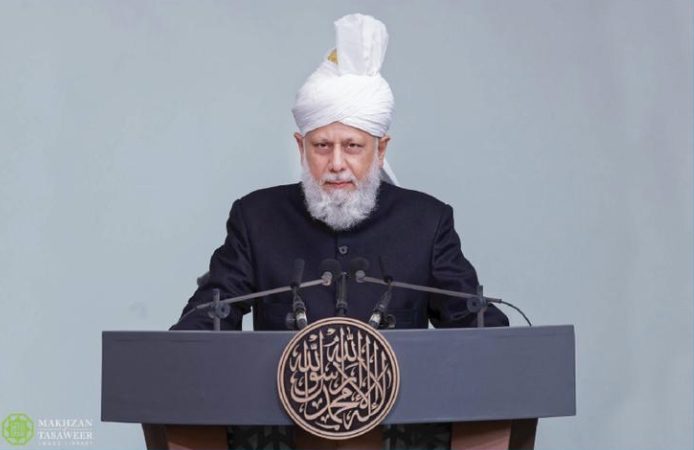After reciting Tashahhud, Ta‘awwuz and Surah al-Fatihah, His Holiness, Hazrat Mirza Masroor Ahmad (aba) said that he would continue mentioning details regarding the destruction of three prominent idols around the time of the Conquest of Makkah.

The Expedition to Destroy Manat
His Holiness (aba) said that there was an expedition of Hazrat Sa’d bin Ash’ali (ra) which took place in Ramadan 8 AH for the destruction of the idol Manat, which was by the shore of the Red Sea in Qudaid. When Hazrat Sa’d (ra) reached Qudaid and advanced to destroy the idol, he initially faced opposition from the locals. Ultimately, Hazrat Sa’d (ra) and those with him advanced towards the idol and destroyed it, after which they returned to the Holy Prophet (sa). There is another narration in which it is recorded that the Holy Prophet (sa) sent Abu Sufyan (ra) to destroy Manat, while other narrations mention that it was Hazrat Ali (ra) who was sent for this task.
The Expedition to Destroy Uzza
His Holiness (aba) said that there was an expedition of Hazrat Khalid bin Walid (ra) towards Nakhlah in Ramadan 8 AH. The convoy comprised 30 men under the leadership of Khalid bin Walid (ra) and was tasked with destroying the idol called Uzza, which was the most prominent idol of the Quraish. It is recorded that when news of Khalid bin Walid’s (ra) imminent arrival was received, the caretaker of Uzza hung a sword on the idol and himself fled to the mountains, whilst praying to Uzza to fight against Hazrat Khalid (ra). When Hazrat Khalid (ra) reached there, he and his men destroyed the idol house of Uzza. When he returned, the Holy Prophet (sa) asked him if he had seen anything significant, to which Hazrat Khalid (ra) responded that he had not. Upon this, the Holy Prophet (sa) said that he had not in fact destroyed the idol Uzza and that he should return in order to do so. Hence, Hazrat Khalid (ra) and his convoy went back, and as the caretakers saw him, they again prayed to Uzza for Hazrat Khalid (ra) to be destroyed. As he arrived, Hazrat Khalid (ra) was reciting couplets which meant that he rejected Uzza, and that he was a witness to Allah destroying it. When all of this was relayed to the Holy Prophet (sa), he said that Uzza would no longer be worshipped anywhere.
The Expedition to Destroy Suwa’
His Holiness (aba) said that then there was the expedition of Hazrat Amr bin al-Aas (ra), which took place in Ramadan 8 AH for the destruction of the idol Suwa’. This idol resembled a woman, and people would circle around this idol. This idol has also been mentioned in the Holy Qur’an:
‘And they say to one another, “Forsake not your gods under any circumstances. And forsake neither Wadd, nor Suwa‘, nor Yaghuth and Ya‘uq and Nasr.”’ (The Holy Qur’an, 71:24)
His Holiness (aba) said it is recorded that the same idols that existed at the time of Noah (as) also existed in Arabia and were named after noble men from the time of Noah (as). When Hazrat Amr bin al-Aas (ra) reached the idol Suwa, its caretaker was sure that somehow Hazrat Amr (ra) would be stopped by the idol. However, Hazrat Amr (ra) advanced and destroyed the idol. Upon seeing his idol destroyed, the caretaker accepted that there is One God and accepted Islam.
The Expedition of Hazrat Khalid bin Walid (ra) towards the Banu Jazimah
His Holiness (aba) said that then there was the expedition of Hazrat Khalid bin Walid (ra) towards the Banu Jazimah in Shawwal 8 AH. After the Conquest of Makkah, when Hazrat Khalid (ra) returned having destroyed the idol Uzza, the Holy Prophet (sa) sent him towards the Banu Jazimah with instructions to invite them to Islam, and with the instruction not to fight with them. Hazrat Khalid bin Walid (ra) set out with 350 men, and upon arriving there, he found the people prepared to fight. Hazrat Khalid (ra) asked them to lay down their arms, and when they did, they were taken prisoner as their intentions were unclear at the time.
In a narration, it is recorded that Hazrat Khalid (ra) asked about their faith, to which they replied that they were Muslims; however, they had taken up arms out of precaution as they were at odds with another Arabian tribe. However, this answer initially struck doubt in Hazrat Khalid (ra). Then, later, the people of Banu Jazimah did not declare their acceptance of Islam, but only declared that they were leaving their faith. This only cast further doubt, and so it is recorded that in the night, Hazrat Khalid (ra) instructed that the prisoners be killed. However, the Muhajirin (migrants) and Ansar (natives to Madinah) did not agree with Hazrat Khalid (ra) and refused to do so, saying that they were Muslims and even went on to release the prisoners. When this news reached the Holy Prophet (sa), he asked whether someone had not refuted Hazrat Khalid (ra). The Holy Prophet (sa) was saddened, and he said he had not sent Hazrat Khalid (ra) to kill them, but rather he had sent him to invite them to Islam. The Holy Prophet (sa) prayed to God, saying he was not party to what Hazrat Khalid (ra) had done. He then expressed his displeasure to Hazrat Khalid (ra) for his actions and his haste, and later the Holy Prophet (sa) sent Hazrat Ali (ra) to pay the blood money of any prisoner who was killed. Hazrat Ali (ra) returned to the Holy Prophet (sa) and reported that everything, even the smallest of things, was returned to the Banu Jazimah, and any leftover wealth was also given to them. The Holy Prophet (sa) was pleased about this and commended Hazrat Ali (ra).
His Holiness (aba) said that this expedition was also a fulfilment of a dream of the Holy Prophet (sa) in which he saw that he was eating something called Hais, and initially it seemed good; however, he began choking on it, at which point Hazrat Ali (ra) came and saved the Holy Prophet (sa) from choking in the dream. Hazrat Abu Bakr (ra) interpreted this dream to mean that the Holy Prophet (sa) would send an expedition with a good purpose, but it would cause disappointment, and Hazrat Ali (ra) would then be sent to fix the matter.
His Holiness (aba) presented various references highlighting the details of this incident, and said that this was clearly not Hazrat Khalid’s (ra) intention; rather, this was a mistake in judgment and a lapse which resulted in this incident taking place. When the Holy Prophet (sa) had the matter investigated, he determined that rather than equal retribution, it was more appropriate for the blood money to be paid. After Hazrat Khalid (ra) offered his apology, the Holy Prophet (sa) forgave him and, a short while later, appointed Hazrat Khalid (ra) as the leader of a contingent in the Battle of Hunain.
The Expedition of Hazrat Hisham bin al-Aas (ra) to Yalamlam
His Holiness (aba) said that then there was the expedition of Yalamlam under the leadership of Hazrat Hisham bin al-Aas (ra), who led 200 men towards Yalamlam. There was also the expedition of Uranah under the leadership of Hazrat Khalid bin Sa’id bin al-Aas with 300 men. These expeditions are not widely recorded, and so their authenticity is unclear.
His Holiness (aba) said that these incidents make clear that the Holy Prophet (sa) never resorted to harshness, nor did he instruct for people to be killed during the expeditions, as some enemies of Islam allege. Rather, the Holy Prophet (sa) would express great displeasure if something of this nature took place even by mistake.
His Holiness (aba) said that further mention of the battles and expeditions from the life of the Holy Prophet (sa) would be mentioned in the future.
Summary prepared by The Review of Religions




Add Comment